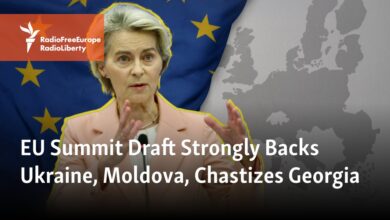Hard right’s Simion in with a chance as Romanians vote for president

Romanians vote on Sunday in the first round of a presidential election that may give a shot at victory to hard-right politician George Simion, who opposes military aid to Ukraine, admires Donald Trump and wants to emulate Giorgia Meloni’s Italy.
Outgoing two-term president Klaus Iohannis, 65, had cemented Romania’s strong pro-western stance but was accused of not doing enough to fight corruption.
Voting starts at 0500 GMT and ends at 1900 GMT with exit polls to follow immediately. The second round is scheduled for December 8 while a parliamentary election is also due next Sunday.
Voting by Romanians abroad, who can influence the result and where Simion is popular, began on Friday. Simion voted in Rome.
Opinion surveys show leftist Prime Minister Marcel Ciolacu, 56, leader of Romania’s largest party, the Social Democrats, will make it into the run-off vote with Simion, 38, of the Alliance for Uniting Romanians the likely runner-up.
Analysts expect Ciolacu to win the second round against Simion, appealing to moderates and touting his experience running Romania during a war next door, but do not rule out a switch-up amid frustration with the high cost of living.
They also say the prospects of a Ciolacu-Simion run-off vote could mobilize center-right voters in favor of Elena Lasconi, leader of center-right opposition Save Romania Union.
Simion has cast the election as a choice between an entrenched political class beholden to foreign interests in Brussels and himself, an outsider who will defend Romania’s economy and sovereignty. Romania has the EU’s largest share of people at risk of poverty.
“We take as a model the right-wing government formed in Italy,” Simion told foreign media earlier this week.
Since Russia attacked Ukraine in 2022, Romania has enabled the export of millions of tons of grain through its Black Sea port of Constanta and provided military aid, including the donation of a Patriot air defense battery.
“Romania has been for Ukraine unconditionally and it will remain so,” Ciolacu told television channel Antena3.
Senate speaker Nicolae Ciuca, leader of the Liberal Party that is currently in a strained ruling coalition with Ciolacu’s party was trailing behind Lasconi, surveys showed.
“The outcome is still very difficult to predict due to the high concentration of candidates and the splitting of the center-right vote,” said Sergiu Miscoiu, a political science professor at Babes-Bolyai University.
Most candidates, he said, have campaigned on conservative messages such as protecting family values.
“Mainstream party candidates have a very catch-all message, on the one hand the nation, the army, religion and so on. On the other hand, we see a commitment to Europe, although it is seen more as a revenue source than an inspiration for values.”
Romania’s president, limited to two five-year terms, has a semi-executive role which includes heading the armed forces and chairing the supreme defense council that decides on military aid.
The president represents the country at EU and NATO summits and appoints the prime minister, chief judges, prosecutors and secret service heads.




